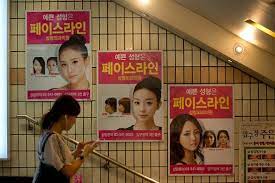South Korea is often called ‘the plastic surgery capital of the world.’ It is the country with the highest percentage of surgeons in plastic surgery (2.6% as of 2018) among all doctors. Hence, cosmetic surgery advertisements can easily be seen in Gangnam-gu, Seoul, where people come for surgery ‘expeditions’ from both domestic and overseas. But the public is often unwelcoming to such advertisements. Accordingly, since 2014, Seoul Metro has reduced the proportion of plastic advertisements in public transportation by 20% in subway cars and stations. It also banned advertisements comparing pictures of before and after surgery that can cause discomfort. Nevertheless, advertisements are now expanding on the Internet and other media platforms, and there are voices calling for additional government regulations. Between the freedom of advertising of hospitals and the goal of pursuing public interest, how far should the Korean government regulate cosmetic surgery advertisements?
Provocative cosmetic surgery advertisements often use price promotions violating government restrictions. Moreover, the rise of online platforms providing information on plastic surgery is conducting aggressive marketing in the blind spots of medical laws. As a result, consumers are pushed towards plastic surgery by the social atmosphere insensitive to forcing beauty. Therefore, government intervention to regulate plastic surgery and beauty advertisements is necessary.

First, many cosmetic surgery advertisements dramatically emphasize the effectiveness and price promotion, even in illegal ways. According to Article 27 (3) of the Medical Service Act, "No person may introduce, arrange or solicit a patient to a medical institution or medical personnel for profits, by exempting or discounting medical expenses to be paid by a patient (…), offering money, etc." However, we often see plastic surgery discounts and tight-selling advertisements targeting graduate students and other potential customers. In 2020, Rep. Lee Jongseong pointed out that the Ministry of Health and Welfare (MOHW) receives quarterly reports of monitored results from the deliberation committee for medical advertisements, but does not take actual measures (such as requesting punishment to the local public health centers). Second, beauty advertisements these days have moved to other media platforms, making it difficult to properly manage them without government intervention. In his interview with Kukmin Ilbo in March, a PR manager of a plastic surgery clinic in Gangnam-gu disclosed that 80% of the customers came after seeing false advertisements posted by hired agencies. The current system cannot monitor medical advertisements on platforms, and the Korea Fair Trade Commission said, "It would be more efficient for the MOHW to impose sanctions under the Medical Service Act." This is because the MOHW has grounds to request an investigation into illegal advertisements and issue correction orders, including suspension of business. In response, the MOHW said "We are proceeding for revision (of the Medical Service Act) by including advertisements posted on medical advertising platforms in the preliminary review of the deliberation committee for medical advertisements[1]." Third, excessive beauty advertisements promote uniform beauty standards and strengthen social insensitivity to discrimination based on appearance. In 2016, Professor Kim In-sook of Changwon National University’s Dept. of Communication demonstrated a positive correlation between plastic surgery intention and surgery advertisements, through appearance satisfaction and internalization of appearance standards.[2] Cosmetic surgery advertisements stimulating the insecurity and appearance-oriented view in people’s minds fill public transportation, and many cause actual discomfort. Of the 1,182 advertisement-related complaints filed on Lines 1 to 4 in 2016, a staggering 91.4% (1,080 cases) were found to be due to plastic surgery or advertisements portraying women.
Aggressive cosmetic surgery advertisements are often done in illegal ways, and diversified advertising channels cannot be controlled without government regulations. They also make it difficult for their viewers to establish a healthy body image. Plastic surgery advertisements should guarantee medical personnel's freedom, but they need government intervention to protect consumers' rights to know and to help keep consumers safe from harmful messages.
[1] “Don't believe plastic surgery reviews, 80% is a lie" Gangnam’s PR manager confessed (March 20, 2023, Kukmin Ilbo) https://bit.ly/3HvvjOH
[2] Kim, InSook (2016). The impact of exposure of cosmetic surgery advertisements to body satisfaction and intention of cosmetic surgery : The mediating effect of attitude toward body image. Journal of Communication Science. 16(3). pp.49-76

